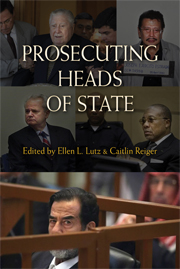Book contents
- Frontmatter
- Contents
- List of Contributors
- About the International Center for Transitional Justice
- Foreword
- Preface
- 1 Introduction
- 2 Prosecutions of Heads of State in Europe
- 3 Prosecutions of Heads of State in Latin America
- 4 The Multiple Prosecutions of Augusto Pinochet
- 5 A Leader Takes Flight: The Indictment of Alberto Fujimori
- 6 Charm and Punishment: How the Philippines' Leading Man Became Its Most Famous Prisoner
- 7 Shifting Legitimacy: The Trials of Frederick Chiluba
- 8 A Justice “Trickle-Down”: Rwanda's First Postgenocide President on Trial
- 9 Justice Squandered? The Trial of Slobodan Milošević
- 10 A Big Man in a Small Cell: Charles Taylor and the Special Court for Sierra Leone
- 11 Political Pedagogy, Baghdad Style: The Dujail Trial of Saddam Hussein
- 12 Conclusion
- APPENDIX: List of Prosecutions of Heads of State or Government since 1990
- Selected Bibliography
- Index
9 - Justice Squandered? The Trial of Slobodan Milošević
Published online by Cambridge University Press: 06 August 2009
- Frontmatter
- Contents
- List of Contributors
- About the International Center for Transitional Justice
- Foreword
- Preface
- 1 Introduction
- 2 Prosecutions of Heads of State in Europe
- 3 Prosecutions of Heads of State in Latin America
- 4 The Multiple Prosecutions of Augusto Pinochet
- 5 A Leader Takes Flight: The Indictment of Alberto Fujimori
- 6 Charm and Punishment: How the Philippines' Leading Man Became Its Most Famous Prisoner
- 7 Shifting Legitimacy: The Trials of Frederick Chiluba
- 8 A Justice “Trickle-Down”: Rwanda's First Postgenocide President on Trial
- 9 Justice Squandered? The Trial of Slobodan Milošević
- 10 A Big Man in a Small Cell: Charles Taylor and the Special Court for Sierra Leone
- 11 Political Pedagogy, Baghdad Style: The Dujail Trial of Saddam Hussein
- 12 Conclusion
- APPENDIX: List of Prosecutions of Heads of State or Government since 1990
- Selected Bibliography
- Index
Summary
The death of Slobodan Milošević, the first head of state to be tried before an international tribunal, only ten working days before the end of the grueling trial, was for some the defining moment of the International Criminal Tribunal for the former Yugoslavia (ICTY or the tribunal). Although that may be the case, what defined the trial was not its end but rather its conduct. Despite prosecution assertions to the contrary, the trial was perhaps inevitably going to be perceived, at least symbolically, as about prosecuting a regime and an ideology. To this extent, it should have been acknowledged as a political trial. In this regard, as Gary Bass eloquently argues in his “qualified defense” of “victor's justice,” it was a choice between imperfect justice and no justice at all. The attempt by ICTY prosecutors to isolate the trial from its political context undermined the historical mission of the ICTY and caused many of its intended beneficiaries – the victims of Milošević's campaigns in Croatia, Bosnia and Herzegovina, and Kosovo – to lose confidence in it. A further result of this attempted depoliticization, along with other political developments – such as decisions of the United Nations Security Council, from which it was paradoxically impossible to isolate the ICTY – strengthened the rule of impunity in the former Yugoslavia, a condition that the tribunal had aimed to end.
- Type
- Chapter
- Information
- Prosecuting Heads of State , pp. 176 - 204Publisher: Cambridge University PressPrint publication year: 2009
- 1
- Cited by

